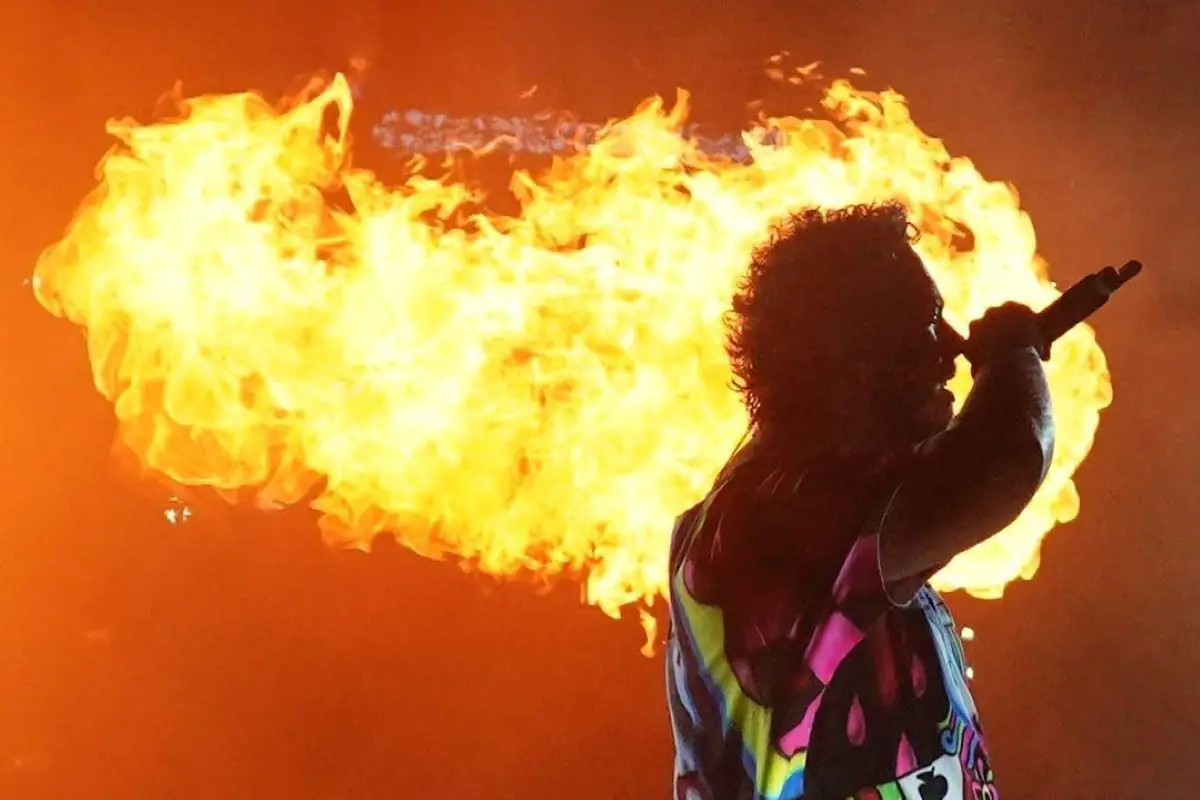Imagine: The year is 2016. You’ve just heard the song “White Iverson” on some Spotify playlist. Would you be willing to bet in that moment that Post Malone would become one of the biggest music stars of the rest of the decade? Yes, in the year 2019, we once again return to auto-tuned crooner Post Malone and his latest album, “Hollywood’s Bleeding.” He’s already conquered the world a few times … where can he go now?
Post Malone received his big breakthrough in 2016 with the aforementioned “White Iverson,” a clouded track about how cool the artist is, like a Caucasian Allen Iverson. Over the next few years, he became a superstar with huge hits like “Congratulations,” “rockstar,” “Psycho,” “Better Now,” “Wow.” and “Sunflower.” He spent over eight months in the Top 10 on the strength of the last two and “Goodbyes.”
The world of mainstream hip-hop in the ‘10s has gravitated toward atmosphere and vibes thanks to the influence of Kid Cudi, and Post fits right in with creeping beats, singing delivery, melancholy lyrics and lots of drug references.
https://www.instagram.com/p/BsJuAlVh6_z/?utm_source=ig_web_copy_link
In some ways, he’s the main pop face for the movement: less experimental than Travis Scott, less hip-hop and cringy than Drake, more consistent than Kid Cudi and better hooks than a lot of people. He’s also less satisfying as an artist than his major contemporaries. “Stoney” and “beerbongs & bentleys” existed more than anything. Post Malone’s not particularly artful or creative, nor is he an interesting figure. His output is more background to college parties than invested music.
On “Hollywood’s Bleeding,” Post Malone takes the listener in a darker direction. On the one hand, the move doesn’t seem like a huge leap. Post’s music has always been mopey. Most of his songs are either about how he’s been embittered by betrayals and breakups or his various prescription drug addictions with lonely, cheerless synthesizers in the background. He’s not exactly been a happy-go-lucky artist.
And yet, he’s never seemed serious about his misery, unlike fellow “sadboi” artists like Juice WRLD. You can find plenty of goofy stories about him online, like the time he vibed to a mariachi cover of “Congratulations.” He also references old Disney Channel shows on songs about breakups or codeine — “Stoney” and “beerbongs & bentleys” both had some fun.
“Hollywood’s Bleeding” would at first seem to run on a similar line. Sure, the title track is a desolate rock track about how “everyone’s gone, but no one’s leaving” in an apocalyptic vision of Hollywood, but lead singles “Sunflower” and “Wow,” as well as early tracks “Saint-Tropez” and “Enemies,” are silly and light bops, especially “Sunflower,” with its Swae Lee feature and “Spider-Man: Into the Spider-Verse” connection. Post started his last two albums on dark notes, so one could assume “Hollywood’s Bleeding” is taking a similar path.
https://www.instagram.com/p/BscajLJBFts/?utm_source=ig_web_copy_link
One would assume wrong.
The rest of the album is just breakup song after breakup song. Malone, when not abjectly miserable on songs like “Circles,” is sullen and spiteful in a surprisingly enjoyable way. He’s had his heart broken, but he’s become successful and can now laugh in the face of his hurt.
It’s summed up in the chorus to “A Thousand Bad Times”: “I had a thousand bad times, so what’s another bad time to me? You try to burn my house down, but what’s another house to me? ‘Cause I can take anything you can give me. It’s gonna take a lot more to kill me, so thank you for the grave: I needed me a place to sleep.”
The lyrical impulse of “Hollywood’s Bleeding” is negative but human, and it really taps into a strong vein of Post’s. For most of his previous output, he was a vibe more than anything. You don’t listen to “beerbongs & bentleys” because you want insights into the tortured soul of Post Malone or a vicarious revelry of grungy excess. You come because he generally sounds sad and atmospheric.
Here, however, Post is actually a striking figure with some oddly poetic lines like “We couldn’t turn around ‘til we were upside down,” and “I never needed anything from you, and all I asked for was the truth.” The Hamlet-esque silhouette on the cover conveys well a tortured soul lashing out.
Once you get into the body of the album, you never quite forget the goofier moments like “Wow.,” but they become inconsequential. Do I recommend the LP because I think it’s uplifting? No. Do I recommend the LP because I think it’s emotionally interesting? Yes.
The production is also a huge part of the appeal of “Hollywood’s Bleeding.” Post Malone has previously shown inclinations toward rock and other genres outside of strict hip-hop or R&B. He tried folk music before his breakthrough, he’s written some okay acoustic ballads like “Stay” and his music has always been rap in a loose, post-Kid Cudi and post-Travis Scott sense of the word.
Here, he’s going as full rock as drum machines will allow. The album has a ton of surprisingly good guitar riffs, and Post’s goatlike warble gets some grit in the hooks. He even features Ozzy Osbourne! If he were really trying to be a rapper, his “elder statesman” feature spot would be any number of ‘90s rappers, or maybe George Clinton. Not Post: He wants Black Sabbath frontman, metal pioneer, “Crazy Train” guy and reality TV star, Osbourne, to sing the chorus for “Take What You Need.”
No, “Hollywood’s Bleeding” is a definite move into the world of pop and rock. He’s not here to become a game-changer or anything, but he has fun with his guitar lines. In a better world, he would overtake Imagine Dragons as the face of vaguely rock-influenced music in the mainstream.
https://www.instagram.com/p/BlJcI3zjSMY/?utm_source=ig_web_copy_link
But more than that, Post develops as an artist. He always seemed bored and unhappy as a hip-hop/R&B singer. In 2017, he bemoaned how the popular rap of today has no emotional resonance for darker emotions compared to other genres. The statement prompted mass negative feedback since he was actively contributing to the situation he described.
At last, Post Malone is moving into music where he invests himself in his craft. In the larger sphere, the move is a mite awkward. Despite breaking through and enjoying massive success from hip-hop, some of his comments have pointed toward tensions of cultural appropriation between him and rap. Such factors should not be ignored.
As an album, however, “Hollywood’s Bleeding” is quite excellent. His songwriting is vastly improved, his instrumentals are engaging and the album is, to be frank, good. Seeing Post Malone going dark, singles and beginning aside, is far more interesting than anything else he’s released. His growth beyond a willfully underwhelming blandness into something more alive and poetic is a lovely thing.
Imagine: The year is 2019. You’ve just heard “Wow.” on some playlist. Would you be willing to check out the album if you heard it was nothing like the single? I would hope so, because “Hollywood’s Bleeding” is good.
















